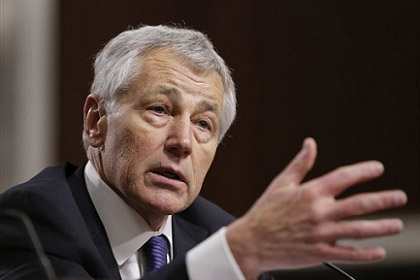The United States needs to be prepared for every option and contingency as the Democratic People's Republic of Korea (DPRK) remains "a dangerous and unpredictable country," U.S. Defense Secretary Chuck Hagel said Tuesday.
Hagel made the remarks while testifying at a hearing before the Senate Appropriations Committee's defense subcommittee on the defense budget, together with Martin Dempsey, chairman of the U.S. Joint Chiefs of Staff, Xinhua reported.
"We know the kind of armaments and artillery that (the DPRK has) lined up against Seoul, (and) their capacity," Hagel told the panel, adding that this is the reason why the Pentagon deployed a Terminal High Altitude Area Defense battery in Guam.
"We have to be prepared for every option, every contingency," he said.
The DPRK carried out its third nuclear test in February as a countermeasure against U.S.-led sanctions and the U.S.-South Korean military exercises. Pyongyang also decided to nullify the armistice agreement signed in 1953 to halt the Korean War and even threaten to launch preemptive nuclear strikes against the United States.
For his part, Dempsey said the U.S. security interests in relation to the Korean Peninsula are to defend the homeland, preserve the Korean Armistice, mitigate the risk of Pyongyang's weapons and protect America's allies in the region.
On Iran, Hagel and Dempsey both said Tehran has not made a decision to build a nuclear weapon, but appears to be positioning itself to preserve that option.
Hagel said the U.S. policy remains "preventing the Iranians from acquiring any capability to weaponize."
Dempsey said the Pentagon has options "both for their acquisition of a nuclear weapon, but also for the other things they are doing," including cyberattacks and weapons proliferation.
The U.S. government has applied a series of draconian sanctions against Iran in an attempt to prevent it from acquiring a nuclear weapon, though Tehran insists its nuclear program is purely for civilian research purposes.
At the same time, Washington has vowed to use any options, including the use of force, to prevent a nuclear-armed Iran.






